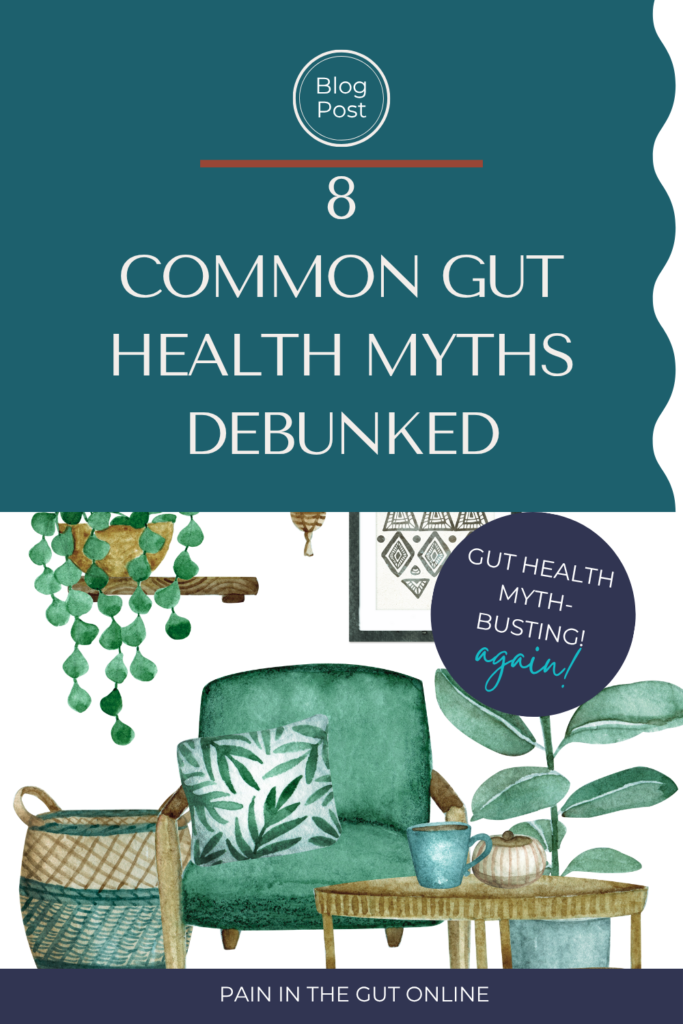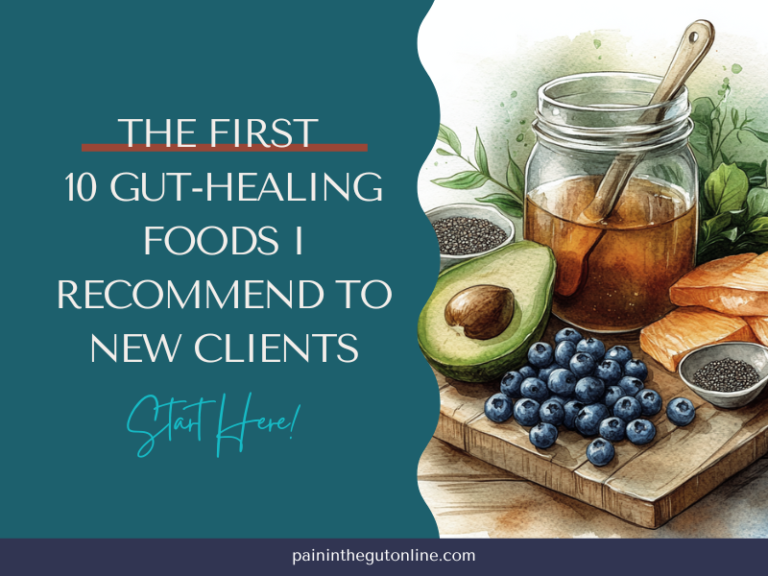GUT HEALTH MYTHS
6 Min Read/ 1,137 Words
Think you know gut health? These 8 common gut health myths are holding you back. Learn the truth + simple tips to support your digestion the right way.

Gut health can feel like a minefield of confusing advice, half-truths, and straight-up nonsense. One person says sparkling water is the only healthy drink, while someone else swears you need a 7-day detox after a weekend of BBQs. So what’s real, and what’s total BS?
Let’s break down 8 of the most common gut health myths, why they’re wrong (or partially wrong), and what you can actually do instead.
Table of Contents
8 Common Gut Health Myths
1.) Sparkling water is always better than soda
Why it’s a myth: While sparkling water doesn’t have the added sugar, artificial sweeteners, or any of the other stuff that makes soda so tough on your gut, it still introduces extra gas into your system, which can lead to bloating.
What to do instead: I love sparkling water as much as the next girl, but if you’re trying to avoid bloat, opt for still water infused with cucumber, mint, or lemon. Save the sparkling water as an occasional treat. Did you know? Even natural carbonation in sparkling water can trigger belching and bloating for some people with sensitive digestion.
2. If you’re bloated after eating, it means you have a food intolerance
Why it’s a myth: Bloating sometimes is totally normal, especially after high-fiber meals or eating a large volume of food. But chronic, painful bloating might mean your gut needs support, not necessarily that you need to cut entire food groups.
What to do instead: Start by slowing down when you eat, chewing well, and tracking when bloating happens. Keeping a food diary can help you determine if a particular food is chronically giving you digestive troubles. If you start to see a pattern, you may want to consider eating less of that food to avoid tummy issues. Did you know? Even stress and posture while eating can cause bloating—sometimes it’s not the food but how your body is processing it.
3.) You need a detox after vacation or eating “bad” foods
Why it’s a myth: Your liver and kidneys already do a fantastic job of detoxing your body, naturally. Juice cleanses or extreme detox diets can actually stress your gut, exacerbating the issues rather than fixing them.
What to do instead: Support your natural detox by hydrating, eating fiber-rich meals, moving your body, and getting enough rest. Basically, all the simple habits we teach here at Pain in the Gut Online 🙂 Did you know? Your gut lining renews itself every 3–5 days—so gentle, consistent habits work better than harsh detoxes.
4.) Gluten is bad for everyone
Why it’s a myth: Unless you have celiac disease or a gluten sensitivity, whole-grain gluten sources can actually support gut health with fiber and nutrients. Did you know that an unbalanced gut can make it harder for your body to digest gluten? Oftentimes, once you heal your gut, you can tolerate gluten again.
What to do instead: Keep a food diary to track your symptoms and look for patterns. If you notice gluten-rich foods, such as bread with wheat flour, continuously cause digestive unrest, you may need to eliminate gluten for a period of time. A great way to pinpoint food intolerance and give your digestive tract a break is to follow a Low FODMAP diet. Did you know? Fermented sourdough bread is often easier on digestion—even for some people who are mildly sensitive.
If gluten isn’t a trigger food for you, focus on the quality of carbs you eat. Choose minimally processed bread and pasta over highly refined versions. Most store-bought gluten-free breads are full of gut-triggering ingredients you should avoid.
5.) More fiber is always better for digestion
Why it’s a myth: Yes, fiber is a vital part of a balanced diet, but too much too quickly can cause gas, bloating, and discomfort. Your gut needs balance, not overload. So, don’t think that just because fiber is good for digestion, you should load up on it all day, every day.
What to do instead: Increase fiber gradually, drink plenty of water, and balance soluble (oats, chia) and insoluble fiber (veggies, whole grains). Did you know? Certain fibers, called prebiotics, are essential to keeping those “good” gut bugs thriving so they can keep you and your gut healthy and well-balanced.
6.) Probiotics will fix your gut health overnight
Why it’s a myth: Probiotics can help replenish “good” bacteria in your gut, but they’re not a magic pill. They work best alongside a gut-friendly diet, stress management, and consistent healthy habits.
What to do instead: Eat a diverse diet that includes foods from a variety of food groups and colors, manage stress, and consider probiotics as one piece of the puzzle, not the entire solution. Did you know? Different probiotic strains do different jobs—so one supplement might not address all your gut needs.
7.) Chewing gum can’t possibly cause bloating
Why it’s (surprisingly) true: Chewing gum makes you swallow more air, which can lead to trapped gas. Sugar-free gums can also have sugar alcohols that cause even more bloating and gas.
What to do instead: If you need something to freshen your breath, try mint tea or natural breath mints instead. Did you know? Even talking a lot while eating can make you swallow extra air, leading to similar bloating issues.
8.) Stress doesn’t affect digestion if your diet is perfect
Why it’s a myth: Your gut and brain are deeply connected. If you’re constantly stressed, your body stays in fight-or-flight mode, which literally slows or stops digestion. Stress is the number one cause of digestive issues.
What to do instead: Take 3–5 deep breaths before eating, practice mindful meals, and add daily stress-relief rituals like walking, journaling, or light stretching. Did you know? About 90% of your body’s serotonin (the “feel-good” hormone) is produced in the gut—so stress management literally changes how your gut feels and functions.
Quick Myth-Busting Checklist
- Sparkling water can still cause bloating—still water wins for sensitive guts
- Bloating doesn’t always mean a food intolerance—sometimes it’s normal
- No detox needed—your body knows how to cleanse itself
- Gluten isn’t bad for everyone—quality and moderation matter
- Too much fiber too fast can backfire—go slow and balance types
- Probiotics aren’t magic—habits matter more than a single capsule
- Gum can cause bloating—yep, even that “harmless” sugar-free stick
- Stress affects digestion just as much as diet does
Wrap-Up
Don’t get fooled by these common gut health myths! Your gut doesn’t need perfection—it needs balance. Forget the extremes, skip the myths, and focus on small, sustainable habits that actually help you feel good.
Want more no-BS gut health tips to help you beat the bloat? Grab my free Gut Health Starter Kit







